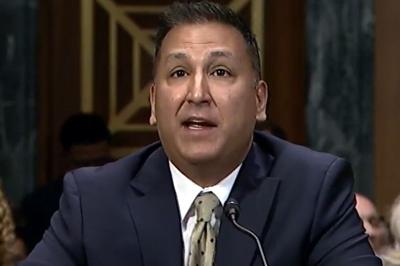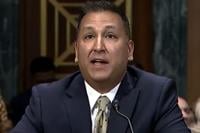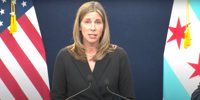
U.S. District Judge Sunil Harjani
While a federal judge had cleared the way for the world's largest lawsuit investment group to sue turkey producers in general over alleged price fixing, the judge said subsidiaries of Burford Capital won't get to sue corporate food giant Cargill, because the lawsuit funders didn't file the right papers at the right time.
On July 7, U.S. District Judge Sunil Harjani denied a request from two corporate entities created by Burford Capital to be allowed to sue Cargill themselves, because they waited one day too long to opt out of Cargill's class action settlement.
"Deadlines for opt-out prevent parties from upending the established class settlement process by coming in late and claiming they are not bound by the settlement," Harjani wrote in his order. "Whether it’s one day, months, or years after - late is late."
The decision comes as one of the latest moves in the sprawling antitrust litigation that has played out in Chicago's federal courts against some of the largest producers of meat products in the world.
The lawsuits have come from throughout the U.S., filed by trial lawyers on behalf of grocers, wholesale food distributors, restaurant owners and consumers, among others.
The lawsuits have accused the producers of chicken, beef, pork and turkey of violating federal antitrust law by allegedly conspiring to artificially set the price of meat too high, costing American retailers, wholesalers and households potentially billions of dollars more than they allegedly should have paid under normal market conditions.
Many of those actions have settled, collectively generating hundreds of millions of dollars in payments.
Cargill, for instance, agreed to pay $32.5 million to settle claims against them over turkey prices. Judge Harjani granted preliminary approval to that settlement in January.
Some claims, however, have continued, and others have generated headlines in the meantime.
One lawsuit in particular, filed by food distributor Sysco Corp., drew national attention when Sysco and Burford brawled in court in 2023 over who should ultimately control Sysco's legal claims.
Sysco had sought to settle its claims and exit the litigation, according to court documents. However, that settlement was opposed by Burford subsidiaries, who believed the settlements were too low to allow the so-called third party litigation financiers to reap an acceptable return on their $140 million investment in Sysco's cases.
When Sysco refused to remain in court, Burford subsidiaries, including the corporate entity Carina Ventures LLC, moved to seize control of Sysco's claims.
Sysco ultimately yielded ownership of its claims to Burford under a settlement agreement, ostensibly allowing the litigation investor to become the plaintiff.
Following that decision, turkey producers asked Judge Harjani to block Carina and other Burford subsidiaries from suing them, saying the investors were in the action only to maximize their profit, and not to address any real harm allegedly caused by the alleged meat price-fixing actions.
In a recent ruling, however, Harjani said Burford and its subsidiaries could continue suing turkey producers, because he believed he had no recourse as a judge to prevent Burford from stepping into court in place of another party who had signed over its legal claims to Burford under an agreement.
However, while the fight over Burford's rights to sue played out, Burford, through Carina and another subsidiary, Amory Investments LLC, filed suit against Cargill.
Amory had secured the rights on behalf of a different client, identified as food distributor Maines Paper & Food Service.
According to court documents, the Burford subsidiaries rights to sue were reflected in lawsuits filed in 2021 and 2023.
Under the terms of the Cargill settlement and Harjani's orders, plaintiffs had until April 21, 2025, to "opt out" of the Cargill settlement, if they wished to continue suing the food producer.
Carina and Amory, however, waited until April 22 to send an email to the administrator of the Cargill settlement in which they indicated their desire to opt out of the settlement.
Settlement administrators denied Carina's and Amory's request to opt out, saying it arrived too late.
Burford, through Carina and Amory, then asked Harjani to overrule the settlement administrators and allow them to opt out and renew their lawsuits against Cargill, likely so they could negotiate settlements with the food producer directly.
In their filing, Carina and Amory claimed their day-late tardiness should be excused by the court, because it was only one day and the lawsuit investors had previously told the court "they do not agree to the terms" of the Cargill settlement "and thus are not bound by it."
They said their previously filed lawsuits should have served as enough proof of their intent to never submit to the Cargill turkey settlement.
But Harjani said Carina and Amory fell well short of abiding by the court's instructions concerning how to opt out of the settlement. These included providing settlement administrators with "the identities of the assignors who purchased the turkey or the total value of their assigned direct turkey purchases during the class period..."
"Carina and Amory did not do any of this," Harjani said.
Harjani further said rulings from the U.S. Seventh Circuit Court of Appeals, which are binding over federal courts in Illinois, have made clear "that a separate (lawsuit) does not exclude a plaintiff from a class action settlement."
And the judge noted that Burford's subsidiaries and their earlier clients, like Sysco, have routinely abided by class action opt-out deadlines and instructions in other settlements within the same the food price litigation.
"... Carina and Amory were litigating under the same docket as the Cargill settlement," Harjani wrote. "Carina and Amory had 81 days to submit the opt-out request.
"They did not do so.
"... Despite their claims that there was only a one-day delay—they still have not done so because their untimely email opt-out failed to include all necessary information such as total value of their assigned direct turkey purchases during the class period that they are seeking to exclude from the settlement.
"Their only explanation—attorney mistake—is not sufficient to amount to excusable neglect," Harjani said.
Carina and Amory are represented by attorneys Christopher C. Goodnow and Jonathan I. Liebman, of Kellogg Hansen Todd Figel & Frederick, of Washington, D.C.




